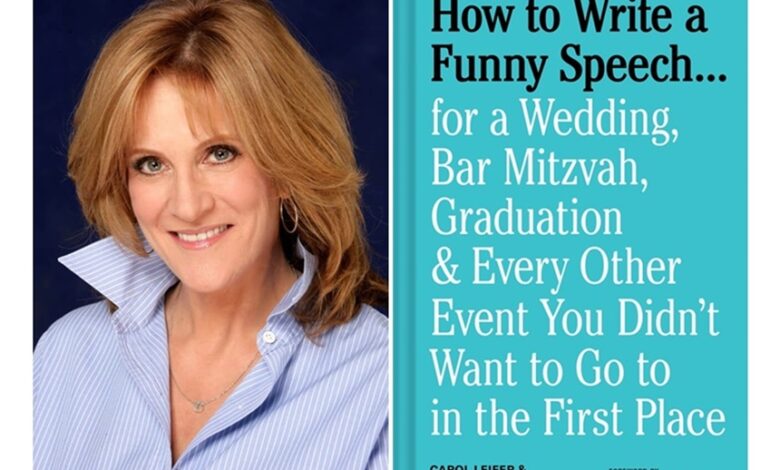I Ain’t ’Fraid of No Toast: Carol Leifer on How to Write a Funny Speech

Maybe you have this nightmare: Unaccustomed to public speaking, you are tapped to give a toast at the celebration of a friend or family member. You have known the person of the hour for years. You love this person. You have stories. You have jokes. But the moment comes to take the microphone, and instead of being charming and funny like Hugh Grant in Four Weddings and a Funeral, you bomb spectacularly, like James Franco at the 2011 Academy Awards.
You are not alone in your glossophobia. According to some surveys, public speaking is a greater stressor than the fear of death.
Carol Leifer feels your pain. Though an accomplished standup comedian and Emmy-winning comedy writer (her estimable credits include Seinfeld and Modern Family), she gets it that standing up in front of even the friendliest of audiences can be nerve-wracking. And she has witnessed enough cringeworthy toasts to pinpoint where the speaker has gone horribly wrong.
In what she jokingly calls “a public service,” Leifer, with comedy writer Rick Mitchell, (The Ellen DeGeneres Show), has written a user-friendly book, How to Write a Funny Speech…for a Wedding, Bar Mitzvah, Graduation & and Every Other Event You Didn’t Want to Go To in the First Place. It contains accessible advice on how to prepare for your five minutes in the spotlight, what to put in, and what to leave out. The authors even share jokes that readers are given permission to steal.
But that right there is a common mistake, Leifer said in a phone interview. Many approach their toast as if it were a set at the Improv; who doesn’t want to make an audience laugh, even at a memorial? (More on that later.) Trying to be the next, well, Carol Leifer, is added pressure that can adversely impact the event at hand.
“Instead of focusing on jokes,” she advises, “share actual stories from your relationship to the person. If you have been chosen to speak at someone’s event, you’re obviously close to them. We emphasize in the book that personal stories are great, because they are testament to what makes your relationship unique. And they usually turn out to be funny in some way. At my wedding, my best friend told a true story about how we met in fifth grade. She always saw me at lunch buying ice cream to eat before my sandwich. That was a funny childhood memory about the genesis of our lifelong friendship. Mining that material is a good bet.”
In comedy, timing is everything. In giving a toast, time is everything. Leifer emphasizes that five minutes is the ideal length of a toast. “Some people just go on and on,” she says. “They forget that less is more, especially now when people’s attention spans are getting less and less.”
Public speaking is not an issue with Leifer. She’s a comedian, after all, and used to working in front of all kinds of audiences. “A friend of mine has a saying,” she says. “People’s greatest fear is speaking in front of large groups of people; most comedians greatest fear is not speaking in front of large groups of people. Stand-up comedy is like giving a speech every night; we know a lot about what audiences respond to and what they don’t. I’m always excited to do it, even if I’m writing a speech for a memorial, which can be a tightrope. Memorials get somber very quickly, but attendees really do appreciate some humor. Funny stories about the deceased loosen up the room. It’s cathartic.”
But she understands why giving a speech or toast can be a nerve-wracking experience. “People aren’t used to being up there alone and being scrutinized,” she says. “Another reason is the advent of social media. Before, you gave a bad speech, end of story. Now, with iPhones, they can go viral and live on in perpetuity. People are nervous because of the threat of forever.”
It is said that funny cannot be taught, but How to Write a Funny Speech breaks down the speechwriting and toast-making process. “We definitely felt we could help,” Leifer says.
For example, two of the most common errors people make in giving a toast is the use of gratuitous profanity and “stories too inside or so disgusting that they cause Uncle Phil’s toupee to start spinning,” she says.
For those who tie themselves up in knots before giving a toast, take caution in how you steel yourself for the task at hand. “People drink to loosen up a little bit and settle their nerves, but you need to take care not to drink too much,” Leifer cautions. “That can make you loose and happy, but you may not know what you are saying.”
It may give you comfort to know that even Leifer gets a little nervous before she does standup. That’s a good thing. “If I’m not a little nervous, then I’m not in the zone,” she says. “You have to be excited and ready.”
Become a Saturday Evening Post member and enjoy unlimited access.
Subscribe now
Source link




